人教版九年级英语Unit4知识点精讲及练习题
人教版九年级英语Unit4知识点梳理及语法讲义(教师版)

—What’s he like?他是什么样的人?
—He’s outgoing.他是外向的。
【拓展延伸】
(1)“What does sb. look like?”意为“某人长什么样?”,只能用来提问人的外貌,不能用来提问人的性格、品质等。其中like是介词,意为“像”。
13. examination(n.考试) —examine(v.考试;审查)
14. exactly(adv.确切地)—exact(adj.精确的)
15. pride(n.骄傲;自豪)—proud(adj.自豪的;骄傲的)
16. general(adj.总的;普遍的)—generally(adv.通常地)
【注意】陈述句和附加问句在人称、数和时态上必须保持一致,
且附加问句的主语必须为代词。
【拓展延伸】反意疑问句的答语
(1)反意疑问句的答语应符合事实。事实是肯定的用yes,事实是否定的用no
(2) 当句式是“前否后肯”的结构时,翻译要以事实为依据,yes翻译为“不是”,no翻译为“是的”
►—Sheisa student,isn’tshe?她是一个学生,不是吗?
3. help(n/v.帮助) —helpful(adj.有帮助的)—helpless(adj.没有帮助的)
4. interview(v.采访;面试) —interviewer(n.采访者)
5. Asia(n.亚洲)—Asian()
6. deal(v.对付;对待) —dealt(过去式/过去分词)
7. shy(adj.害羞的) —shyness(n.害羞;腼腆)
【用法详解】
(1)
(2)19yearold意为“19岁的”(重点)
2020人教版九年级英语上Unit4课文重难点讲解与练习
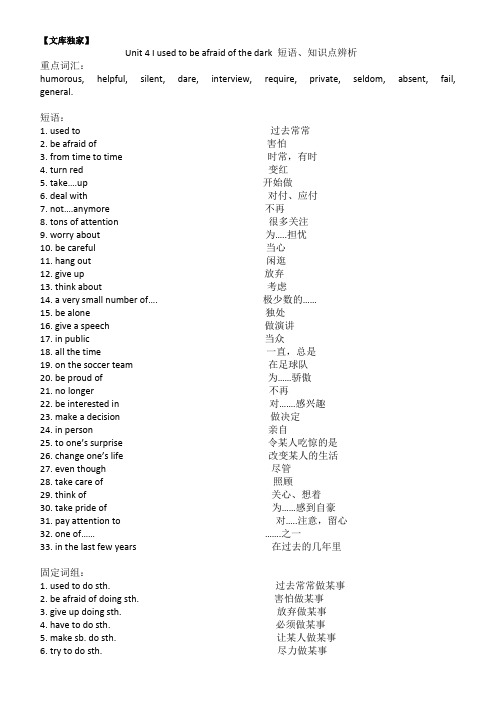
【文库独家】Unit 4 I used to be afraid of the dark 短语、知识点辨析重点词汇:humorous, helpful, silent, dare, interview, require, private, seldom, absent, fail, general.短语:1. used to 过去常常2. be afraid of 害怕3. from time to time 时常,有时4. turn red 变红5. take….up 开始做6. deal with 对付、应付7. not….anymore 不再8. tons of attention 很多关注9. worry about 为…..担忧10. be careful 当心11. hang out 闲逛12. give up 放弃13. think about 考虑14. a very small number of…. 极少数的……15. be alone 独处16. give a speech 做演讲17. in public 当众18. all the time 一直,总是19. on the soccer team 在足球队20. be proud of 为……骄傲21. no longer 不再22. be interested in 对…….感兴趣23. make a decision 做决定24. in person 亲自25. to one’s surprise 令某人吃惊的是26. change one’s life 改变某人的生活27. even though 尽管28. take care of 照顾29. think of 关心、想着30. take pride of 为……感到自豪31. pay attention to 对…..注意,留心32. one of………….之一33. in the last few years 在过去的几年里固定词组:1. used to do sth. 过去常常做某事2. be afraid of doing sth. 害怕做某事3. give up doing sth. 放弃做某事4. have to do sth. 必须做某事5. make sb. do sth. 让某人做某事6. try to do sth. 尽力做某事7. adj. + enough to do sth. 足够……而能做某事8. be prepared to do sth. 准备做某事9. see sb. doing sth. 看见某人在做某事10. take up doing sth. 开始做某事11. begin to do sth. 开始做某事12. require sb. to do sth. 要求某人做某事13. decide to do sth. 决定做某某14. make a decision to do sth. 决定做某事15. It’s hard to believe that……很难相信……….16. It has been + 一段时间+ since + 从句自从……以来已经有很长的时间了17. dare to do sth. 敢于做某事18. It’s + adj. + for sb. + to do sth. 对某人来说做某事是……的重点句型:1. I used to be afraid of the dark. 我过去常常怕黑。
人教版九年级英语第四单元Unit 4 Section A+B知识点精讲
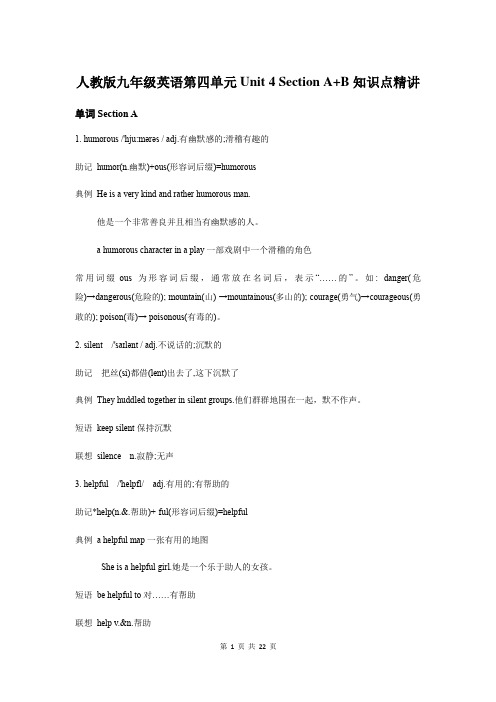
人教版九年级英语第四单元Unit 4 Section A+B知识点精讲单词Section A1. humorous /'hju:mərəs / adj.有幽默感的;滑稽有趣的助记humor(n.幽默)+ous(形容词后缀)=humorous典例He is a very kind and rather humorous man.他是一个非常善良并且相当有幽默感的人。
a humorous character in a play一部戏剧中一个滑稽的角色常用词缀-ous为形容词后缀,通常放在名词后,表示“……的”。
如: danger(危险)→dangerous(危险的); mountain(山) →mountainous(多山的); courage(勇气)→courageous(勇敢的); poison(毒)→ poisonous(有毒的)。
2. silent /'saɪlənt / adj.不说话的;沉默的助记把丝(si)都借(lent)出去了,这下沉默了典例They huddled together in silent groups.他们群群地围在一起,默不作声。
短语keep silent保持沉默联想silence n.寂静;无声3. helpful /'helpfl/ adj.有用的;有帮助的助记*help(n.&.帮助)+-ful(形容词后缀)=helpful典例a helpful map一张有用的地图She is a helpful girl.她是一个乐于助人的女孩。
短语be helpful to对……有帮助联想help v.&n.帮助常用词缀形容词后缀-ful通常位于既可用作动词也可用作名词的单词后,常见的词有use→ useful(有用的); thank→ thankful(感激的);care→ careful(细心的)等。
4. score /skɔː(r)/ n.&v.得分;进球助记sore(疼痛的)中间加个c,得分/进球光疼是不够的。
Unit4Iusedtobeafraidofthedark.重点知识点提升训练人教版九年级英语
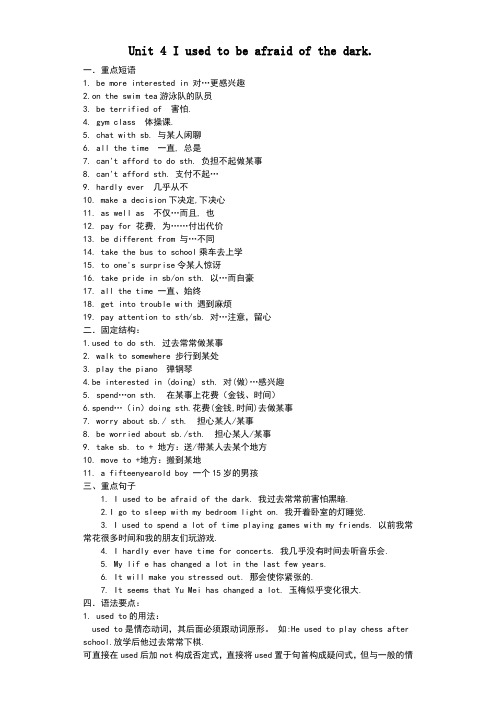
Unit 4 I used to be afraid of the dark.一.重点短语1. be more interested in 对…更感兴趣2.on the swim tea游泳队的队员3. be terrified of 害怕.4. gym class 体操课.5. chat with sb. 与某人闲聊6. all the time 一直, 总是7. can't afford to do sth. 负担不起做某事8. can't afford sth. 支付不起…9. hardly ever 几乎从不10. make a decision下决定,下决心11. as well as 不仅…而且, 也12. pay for 花费, 为……付出代价13. be different from 与…不同14. take the bus to school乘车去上学15. to one's surprise令某人惊讶16. take pride in sb/on sth. 以…而自豪17. all the time 一直、始终18. get into trouble with 遇到麻烦19. pay attention to sth/sb. 对…注意,留心二.固定结构:ed to do sth. 过去常常做某事2. walk to somewhere 步行到某处3. play the piano 弹钢琴4.be interested in (doing) sth. 对(做)…感兴趣5. spend…on sth. 在某事上花费(金钱、时间)6.spend…(in)doing sth.花费(金钱,时间)去做某事7. worry about sb./ sth. 担心某人/某事8. be worried about sb./sth. 担心某人/某事9. take sb. to + 地方:送/带某人去某个地方10. move to +地方:搬到某地11. a fifteenyearold boy 一个15岁的男孩三、重点句子1. I used to be afraid of the dark. 我过去常常前害怕黑暗.2.I go to sleep with my bedroom light on. 我开着卧室的灯睡觉.3. I used to spend a lot of time playing games with my friends. 以前我常常花很多时间和我的朋友们玩游戏.4. I hardly ever have time for concerts. 我几乎没有时间去听音乐会.5. My lif e has changed a lot in the last few years.6. It will make you stressed out. 那会使你紧张的.7. It seems that Yu Mei has changed a lot. 玉梅似乎变化很大.四.语法要点:1. used to的用法:used to是情态动词,其后面必须跟动词原形。
Unit4单词默写知识点详讲义人教版英语九年级全册
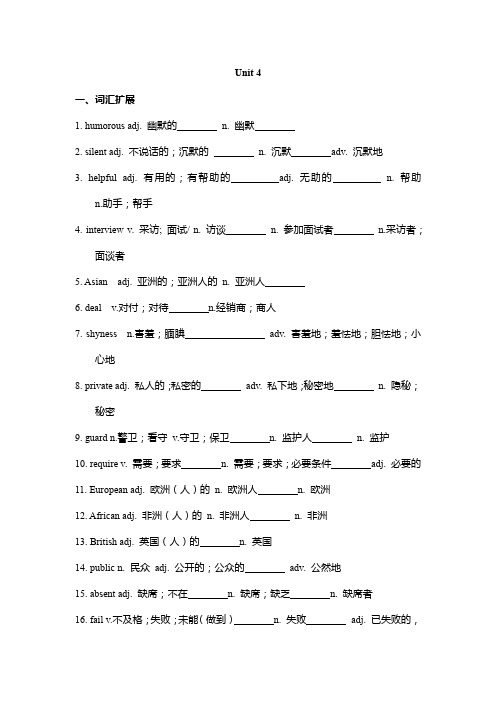
不成功的17. examination n. 考试;审查v. 检查;调查adj. 检查过的n. 检验员;检验员n. 应试者;受审查者;受检查者18. exactly adv. 确切地;精确地adj. 准确的;精密的adj. 不精确的;不严格的;不正确的adv. 不正确地;不精密地19. pride n. 自豪;骄傲adj. 骄傲的;自豪的adv. 骄傲地20. general adj. 总的;普遍的;常规的n. 将军adv. 通常;一般地21. introduction n. 介绍v. 介绍n. 介绍人答案版2. silent adj. 不说话的;沉默的silence n. 沉默silently adv. 沉默地3. helpful adj. 有用的;有帮助的helpless adj. 无助的help n. 帮助helper n.助手;帮手4. interview v. 采访; 面试/ n. 访谈interviewee n. 参加面试者interviewer n.采访者;面谈者6. deal v.对付;对待dealer n.经销商;商人7. shyness n.害羞;腼腆shy adj.害羞的shyly adv. 害羞地;羞怯地;胆怯地;小心地8. private adj. 私人的;私密的privately adv. 私下地;秘密地privacy n. 隐秘;秘密9. guard n.警卫;看守v.守卫;保卫guardian n. 监护人guardianship n. 监护10. require v. 需要;要求requirement n. 需要;要求;必要条件required adj. 必要的11. European adj. 欧洲(人)的n. 欧洲人Europe n. 欧洲12. African adj. 非洲(人)的n. 非洲人Africa n. 非洲13. British adj. 英国(人)的Britain n. 英国14. public n. 民众adj. 公开的;公众的publicly adv. 公然地15. absent adj. 缺席;不在absence n. 缺席;缺乏absentee n. 缺席者16. fail v.不及格;失败;未能(做到)failure n. 失败failed adj. 已失败的,不成功的17. examination n. 考试;审查examine v. 检查;调查examined adj. 检查过的examiner n. 检验员;检验员examinee n. 应试者;受审查者;受检查者18. exactly adv. 确切地;精确地exact adj. 准确的;精密的inexact adj. 不精确的;不严格的;不正确的inexactly adv. 不正确地;不精密地19. pride n. 自豪;骄傲proud adj. 骄傲的;自豪的proudly adv. 骄傲地20. general adj. 总的;普遍的;常规的n. 将军generally adv. 通常;一般地21. introduction n. 介绍introduce v. 介绍introducer n. 介绍人二、短语搭配ed to do sth 过去常常做某2.be afraid of doing sth 害怕做某事3.have to do sth 必须做某事4.make sb do sth 让某人做某事5.give up doing sth 放弃做什么6.try to do sth 尽力做某事7.adj+ enough to do sth 足够…而能够做某事8.be prepared to do sth 准备做某事9.see sb doing sth 看见某人在做某事10.begin to so sth 开始做某事11require sb to do sth 要求某人做某事12.decide to do 决定做某事13.make a decision to do sth 决定做某事14.It’s hard to believe that …很难相信……15.It +has+been +一段时间+ since+从句自从……以来已经有很多长时间了16.dare to do sth 敢于做某事17.It’s adj+ for sb+ to do sth对某人来说做某18.take up doing sth 开始做某事三、知识点详解1. humorous/ ˈhjuːmərəs/ adj. 有幽默感的;滑稽有趣的humor n. 幽默;humorous adj.有幽默感的;滑稽有趣的2. silent /ˈsaɪlənt/ adj. 不说话的;沉默的silence作名词,意为“沉默;寂静”,是不可数名词。
人教版初三英语Unit4SectionA课文回顾及练习题(含详细解说)
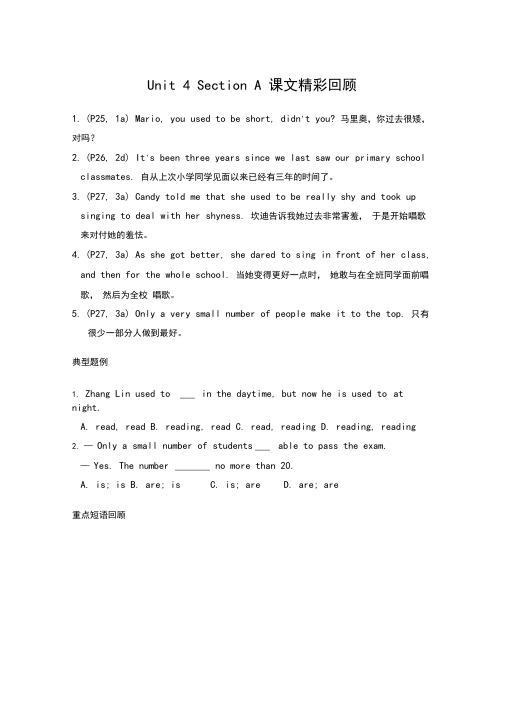
Unit 4 Section A 课文精彩回顾1.(P25, 1a) Mario, you used to be short, didn't you? 马里奥,你过去很矮,对吗?2.(P26, 2d) It's been three years since we last saw our primary school classmates. 自从上次小学同学见面以来已经有三年的时间了。
3.(P27, 3a) Candy told me that she used to be really shy and took up singing to deal with her shyness. 坎迪告诉我她过去非常害羞,于是开始唱歌来对付她的羞怯。
4.(P27, 3a) As she got better, she dared to sing in front of her class, and then for the whole school. 当她变得更好一点时,她敢与在全班同学面前唱歌,然后为全校唱歌。
5.(P27, 3a) Only a very small number of people make it to the top. 只有很少一部分人做到最好。
典型题例1.Zhang Lin used to ___ in the daytime, but now he is used to at night.A. read, readB. reading, readC. read, readingD. reading, reading2.—Only a small number of students ___ able to pass the exam.—Yes. The number _______ no more than 20.A. is; isB. are; isC. is; areD. are; are重点短语回顾自我测试及解答【1 】She WaS Very shy, SO She USed to be _ 说话)in class.【2】I ' m afraid OfiVing a S ______ in public.【3】After that, he became more _______ (interest) in history.【4】He didn ' t dare _______ (SPeak) in front of the people.【5】At last, he made an important ____ 决定).【6】He won' t dare _____ his promise.A. breakB. to breakC. break ingD. breaks【7】 一Mike, you ' Ve got so many beautiful Stam P—Yeah. I ____ collect StamPS Whe n I WaS 8 years old.A. WaS USed toB. USed toC. am USed toD. USed【8】Mario is afraid of __ alone.A. be B bei ng C. is D. to【9】 _____ StUdy in No.4 MiddIe School?A. Did you USed toB. Do you USe toC. Do you USed toD. Did you USe to【10 】There ______ a SWimming pool here.A. USed to haveB. WaS USed to beC. USed to beD. is USed to hav ing1. u sed to do sth. 故去常常做某事 3. f rom time to time 时常;有时 5. take up 开始做 7. not …anymore 不再 9. worry about 为 . 担心 11. a small number of 少数13. give a SPeeCh 做演讲2. be afraid of Sth. 害怕某事 /物4. O n the SOCCer team 在足球队6. d eal with 处理;应对8. tonS of attention 很多关注10. hang out 闲逛12. give uP 放弃14. in PubliC 当众中考真题再现1.--Many StUdents dontknow how to ______ StreSS and become worried.--I think they'd better ask their teacher for help.A. argue WithB. deal WithC. quarrel WithD. come UP With2.In our school Iibrary there _ a number of books on SCience, and in theseyears the nu mber of them ___ grow ing Iarger and larger.A. are; isB. is; areC. have; areD. have; is3.--My aunt goes to climb mountains every SUn day.--Oh? BUt She ______ hate CIimbi ng mountains.A. used toB. was usedtoC. is usedtoUnit 4 Section A 课文精彩回顾1.(P25, 1a) Mario, you used to be short, didn't you? 马里奥,你过去很矮,对吗?【点拨】USed to意为过去常常”这是个固定结构,to后跟动词原形,而且没有人称和数的变化,它只有一种时态,只表示过去,而现在已经不再做了,因此常用助动词did进行否定或提问。
人教版英语九年级全册Unit4(备课精品):Section A 课文重难点精讲练
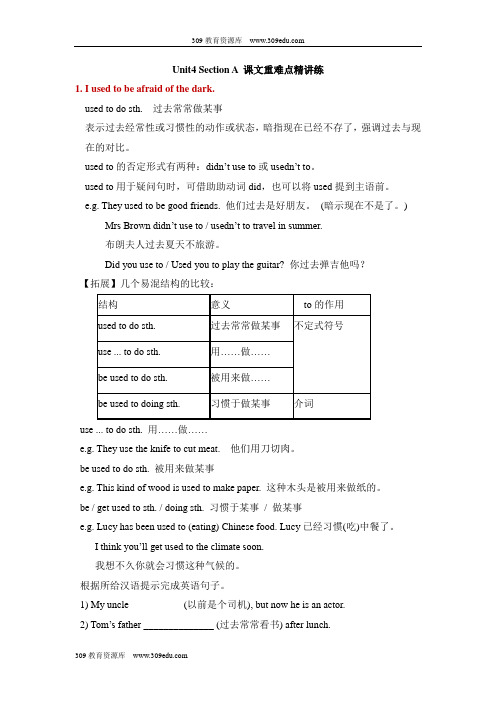
Unit4 Section A 课文重难点精讲练1. I used to be afraid of the dark.used to do sth. 过去常常做某事表示过去经常性或习惯性的动作或状态,暗指现在已经不存了,强调过去与现在的对比。
used to的否定形式有两种:didn’t use to或usedn’t to。
used to用于疑问句时,可借助助动词did,也可以将used提到主语前。
e.g. They used to be good friends. 他们过去是好朋友。
(暗示现在不是了。
)Mrs Brown didn’t use to / usedn’t to travel in summer.布朗夫人过去夏天不旅游。
Did you use to / Used you to play the guitar? 你过去弹吉他吗?【拓展】几个易混结构的比较:use ... to do sth. 用……做……e.g. They use the knife to cut meat. 他们用刀切肉。
be used to do sth. 被用来做某事e.g. This kind of wood is used to make paper. 这种木头是被用来做纸的。
be / get used to sth. / doing sth. 习惯于某事/ 做某事e.g. Lucy has been used to (eating) Chinese food. Lucy已经习惯(吃)中餐了。
I think you’ll get used to the climate soon.我想不久你就会习惯这种气候的。
根据所给汉语提示完成英语句子。
1) My uncle __________ (以前是个司机), but now he is an actor.2) Tom’s father ______________ (过去常常看书) after lunch.3) Mary ________ (以前常常骑自行车) to work, but now she _______ (习惯步行)to work.4) The pencil ________ (被用来书写).2. She still plays the piano from time to time.from time to time是一个固定短语,意为“间或;有时”,常在句中作状语。
人教版英语九年级全册单元unit 4 知识点+测试卷+思维导图

Unit 4 I used to be afraid of the dark.1.重点词汇score, background, guard, speech, public, ant, examination, pride, introduction, interview, dare, require, influence, fail, humorous...2. 短语归纳:ed to do 过去常常做2.deal with 对付;应付3.be proud of 为……骄傲,感到自豪4.take pride in 为……感到自豪5.from time to time 时常,有时6.in public 公开地7.in person 亲身,亲自8.take up sth 开始做,接受,占用9.not…anymore 不再10.worry about 为……担忧11.hang out 闲逛12.think about 考虑13.be alone 独处14.on the soccer team 在足球队15.no longer 不再16.make a decision 做决定17.to one’s surprise 令某人吃惊的是18.even though 尽管19.pay attention to 对……注意,留心20.in the last few years 在过去的几年里3. 必背典句:1. I used to be short. 我过去很矮。
2. I didn’t use to be popular in school. 我过去在学校不受欢迎。
3. -You used to be short, didn’t you? 你过去很矮,是吗?-Yes, I did./No, I didn’t. 是的,我是;不,我不是。
4. -Did he use to wear glasses? 他以前戴眼镜吗?-Yes, he did./ No, he didn’t. 是的,他是;不,他不是。
- 1、下载文档前请自行甄别文档内容的完整性,平台不提供额外的编辑、内容补充、找答案等附加服务。
- 2、"仅部分预览"的文档,不可在线预览部分如存在完整性等问题,可反馈申请退款(可完整预览的文档不适用该条件!)。
- 3、如文档侵犯您的权益,请联系客服反馈,我们会尽快为您处理(人工客服工作时间:9:00-18:30)。
新目的九年级Unit 4课前检测一、重点单词1. 幽默的___________2. 看管,保卫n&v___________3. 缄默的___________4. 很少___________5. 得分,进球___________6. 影响___________7. 背景___________ 8. 缺席的,不在___________9. 面试;采访___________ 10. 失败,不及格___________11. 亚洲的,亚洲人___________ 12. 考试,审查___________12. 人群,观众___________ 14. 准确地,准确地___________15. 私人的___________ 16. 骄傲的___________17. 须要,要求___________ 18. 普遍的;将军___________19. 讲话,发言n. ___________ 20. 介绍n. ___________二、重点短语1. 过去常做某事___________2. 为…感到骄傲___________ ; ___________3. 应对;处理___________4. 做确定___________5. 公开地___________6. 考试不及格___________7. 缺席___________ 8. 一般来说_________9. 亲自;亲身___________ 10. 保持缄默_________11.开场做,从事;占据___________ 12. 受到大量关注___________13. 演讲___________ 14. 有时___________15. 在游泳队里______________ 16. 如此好的办法_________________17. a number of…______________ 18. at least_____________19. advise sb to do sth_____________ 20. have a great influence on sb______________三、重点句型(必背句型)1. ---You used to be short, ___________ you? ---Yes, I _______.2. It ________(be) three years since we last saw our primary school classmates.3. His face ______(turn) red when he talked to girls. I used to see him _____(read)in the library every day.4. Candy told me that she used to be really shy and took up singing ______(deal) with her shyness.5. ________(hang) out with friends _____ (be) almost impossible for me now.6. You really require a lot of talent and hard work ______( succeed). Only a very small number of people make it to the top.7. It’s hard _________(believe) that he used to have difficulties in school.l.8. Sometimes he was absent from classes and_______( fail) his examinations.9. She advised them _______( talk) with their son in person.10. My life__________(change) a lot in the last few years.四、重点语篇From Shy Girl to Pop StarThe Young World magazine i________ 19-year-old pop star Candy Wang, who used to be shy and t_____ up singing to deal with her s____. Now she d_____ to sing in front of thew______ school and crowds. And she gets t____ of attention everywhere she goes. However, she has to be very c________ about w___ I say or do. And she doesn’t have much p________ time anymore. _______(hang) out with friends is almost i_________ because of the guards. Also, being a singer is difficult and people have to be prepared_________(give) up their normal life. It r_______ a lot of talent and hard work. Only a very small number of people m_____ it to the top.He Studies Harder Than He Used toLi Wen, a 15-year-old boy from the countryside, works very hard and d_____ well in school. It is hard _______(believe) that he used to have difficulties. When his parents moved to the city to work, he missed them so much that he often felt l_____ and unhappy, which greatly i_______ his schoolwork. He was sometimes a_____ from classes. Then his parents made the d_________ to send him to a boarding school. Finding the life there d________, Li Wen wanted to leave the school. His teacher a_______ his parents to talk with their son in p____, It was e______ what he needed. He realized that his parents would always love him and take p_____ in everything that he did. Now he is m____ happier than he used to be.考点学问梳理1. used to do sth.; be used to doing sth;be used to do sthused to do sth意为“过去经常做某事”. used to的疑问句形式是“Did…use to do?”或“Used…to do”; used to 的反意疑问句也用助动词did(n’t)或used(n’t)构成。
be used to doing sth意为“习惯于做某事”,其中to是介词,后须接名词或动词-ing形式。
be used to do sth 表示“被用于做某事”,是被动构造。
2.such; sosuch 修饰的中心词是名词,名词前可加一些形容词等限定词修饰,构造如下:such + a/an + adj. + n.(单数可数名词)such a great ideasuch + adj. + n. (不行数名词)such bad weathersuch + adj. + n. (名词复数)such interesting booksso 修饰是融创或副词,它可以和such 修饰单数可数名词做转换;在两多(many. much),两少(little, few)前只能用so ,构造如下:so + adj./adv. so big, so quicklyso + adi. + a/an + n. so great an ideaso many books; so little water3. deal with; do with处理,解决deal—dealt—dealt, 同义短语为do withdeal with 与疑问词how连用,do with与疑问词what连用eg. I don’t know how to deal with the problem.=I don’t know what to do with the problem.4. It is /has been + 时间+ since 从句例如:It’s /has been three years since we met last. 自从我们上次见面已有三年了。
5. fail 失败fail (in) the exam 考试不及格; pass the exam通过考试He failed the math exam last week.fail to do sth. 未能做到某事He failed to catch the bus this morning.6. take pride in “以……为骄傲”, 相当于be proud ofWe all take pride in his success. = We are proud of his success.稳固训练一、词汇练习1. He s________ stays at home. He often travels all over the world.2. None of them talked. They finished their meal in s_________.3. I don’t know why he is a__________ from class again. He used to be on time every day.4. The dictionary is h________ to you.5. That’s ________(exact) what I mean.6. He is the _______(proud) of my family.7. The doctor told my father to give up ________(smoke).8. The mother looks ___________(worry) about her baby.9. You must deal with your ________(shy).10. You ________(须要)a lot of knowledge if you want to be a teacher.11. I used to be _____ ____ ____ ______(在足球队).12.Only ____ ____ _______(少数)of people make it to the top.13.She used to be shy, but now she’s ______ shy ________. (不再)。
